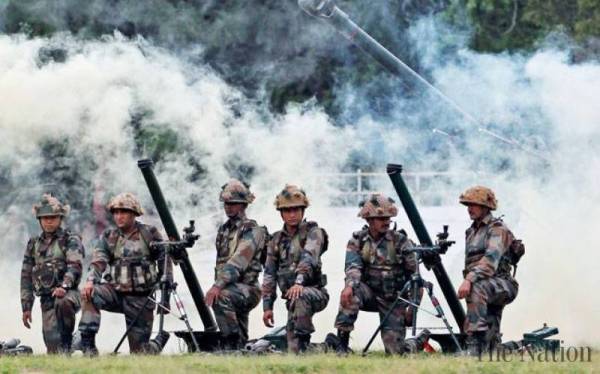By Afrasiab Khattak-Last Monday, Iranian General Mohammad Albaqiri, warned Pakistan of attack inside her territory to destroy what he called terrorist sanctuaries. The threat came about two weeks after Jaish ul-Adl (Army of Justice), a Sunni militant organisation, with a history of launching attacks in Siestan-Balochistan of Iran, accepted the responsibility of killing ten Iranian border guards in an attack carried out from Pakistani side of the border. Soon after the said attack Mr. Javed Zarif, the Iranian Foreign Minister paid a day-long visit to Islamabad and met top political and military leaders of Pakistan. There were reports about the tough talk of the other wise soft spoken top Iranian diplomat during his meeting with Pakistani leaders but at the end of his visit Islamabad gave the impression that the crises has been overcome by strong assurances from Pakistani side about ensuring security on the Pak-Iran border.
However, the latest threats publicly hurled by the Iranian general at Pakistan contradict that impression. These tumultuous developments in the relationship of the two countries can’t be understood without looking at the bigger picture of Middle Eastern politics. Iran is reasserting itself once again as a regional power after the lifting of western financial sanctions, and isn’t amused at all by Pakistan’s joining the Saudi sponsored Islamic Military Alliance which is now headed by General Raheel Sharif (GRS), the former COAS of Pakistan. The aforementioned military alliance is formally supposed to be aimed at curbing terrorism but the total exclusion of Shia Muslim countries from its fold clearly gives away its communal character and it also seems to be geared towards helping KSA in her military adventure in Yemen.
On May 5 a bloody clash took place between border forces of Pakistan and Afghanistan on the Durand Line near Chaman. The clash was preceded by aggressive patrolling by the two sides around the two villages where Pakistani authorities wanted to conduct population census and the Afghans believed that by doing so Pakistanis are crossing the not-so-clearly demarcated Durand Line. Precious lives were lost on both sides. After tense and prolonged negotiations both sides agreed to conduct a geological survey of the villages in question for determining their status. As has happened before the Pakistani side has arbitrarily closed the Speen Boldak crossing point for an indefinite period, leaving a large number of people and vehicles full of goods stranded on both sides. The Pakistani side is totally oblivious to large scale humanitarian problems and economic losses faced by Pashtuns living on both sides of the borders.
Pakistan’s complete disregard for the aspirations and interests of 50 millions plus Pashtuns living in Pakistan is remarkable. In the long term it can’t be without a political cost. If the post-2014 experience is anything to go by, Pakistan has totally given up on winning hearts and minds in Afghanistan; from pushing out Afghan refugees in an extremely harsh and unfriendly manner to trampling upon Pak-Afghan Transit Trade Agreement and humiliating and fleecing Afghans at crossing points on the borders. This clearly indicates that arrogant coercion is the core of Pakistan’s Afghan policy now. Pakistan is neither shy of owning Taliban as the only real ally nor is hesitant in using political and economic pressures on the National Unity Government to degrade it to “one of the parties” in the conflict. It goes without saying that the author of the shift in policy is the Punjabi dominated security establishment of the country which has been running Afghan policy for the last four decades.
The positive atmosphere created by the most recent Kabul visit of a high profile Pakistani Parliamentary delegation has proved once again that there is still a lot of potential for political and diplomatic initiatives in normalising relations between the two countries but as the subsequent events demonstrated that the civilian side from Pakistan is in no position to deliver anything substantial. Taliban’s so-called Spring Offensive continues, some minor precautionary adjustments on part of Pakistan with Trump Administration’s new strategy in Afghanistan not withstanding.
Hostility in relations with India could not be brought down despite PM Nawaz Sharif’s bold and consistent policy of achieving rapprochement with India. Narendra Modi’s government has unfortunately failed to reciprocate the spirit of the policy for normalisation of relations followed by Nawaz Sharif despite formidable hurdles. PM Nawaz Sharif even met the Indian tycoon Jindal as a part of back-door diplomacy, at a time when he was under immense pressure from the crises generated by the so-called Dawn Leaks and Panama Leaks. Some of his opponents, including some ex-serviceman publicly labeled him to be a “security risk”, but he did not back off.
The almost perpetual electoral cycle in India keeps the Modi government tied to the requirements of its electoral politics, particularly when the nature of that politics is growingly communal. The situation in Indian held Kashmir remains grim as India continues to use brute force against the Kashmiri population which is determined to break the status quo by street agitation. It is heartening to see some Indian intellectuals, journalists and civil society activists criticising the policy of Indian oppression in Kashmir. Such voices of conscience inspire hope. Peace constituencies in both countries need to expose jingoistic policies of their respective governments. But the worsening situation on the Line of Control (LOC) can spiral out of hand. Why can’t both the governments make use of the hotline between their militaries and senior level contacts of their respective foreign ministries to diffuse the tension on LOC?
Recent Chinese overtures to India on CPEC have ruffled a few feathers in Islamabad. Unfortunately there is almost an addiction in Pakistan to a delusional thinking about “friendship” with big powers due to our “strategic location.” First it was the US and now it is China. OBOR is basically a roadmap for a gradual transition towards a new world order to replace the present one. The process has to be inclusive, particularly in the immediate neighbourhood and also in Asia. China can’t have indefinite patience with South Asian squabbles. Russia has her own version of the new world order based on Eurasian Heartland theory. Unlike the far away US, China and Russia are almost part of our neighbourhood. They can’t afford to remain indifferent to this heating up. Let‘s not forget that the biggest challenge to these Chinese and Russian visions of a new world order is extremist religious violence in South and West Asia. The sooner the security tsars of Pakistan realise it and wind up their “jihadist” project, the better it would be for everyone, particularly for Pakistan. Pakistan after all can’t remain perpetually at war with her neighbourhood.
Afrasiab Khattak is a retired Senator and an analyst of regional affairs
 Afghanistan Times
Afghanistan Times




